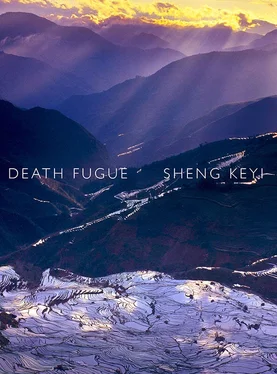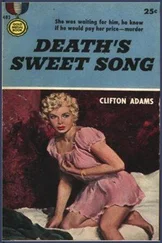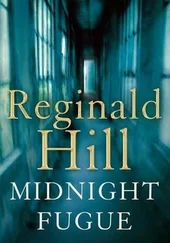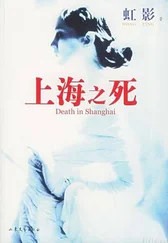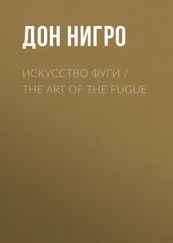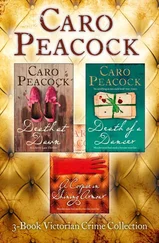‘The jug of wine is no problem, but please don’t recite poetry here,’ Shunyu’s father answered, surprising them. Everyone took it as a joke.
A few days later on a hot rainy afternoon, all sorts of rumours were circulating, and it was hard to verify which were true. Bai Qiu invited Mengliu to travel back with him to his village. On the train, he spoke at length about poetry, saying that death was the best subject matter for it. The next day just as the sun rose, they reached their destination. They walked along the narrow country lane, noting all the peaceful details of the village. Dewdrops formed on the tips of the grass, the vegetables and crops grew plump and full, the chickens and dogs were content. In the midst of this tranquil scene, a peasant woman sat at her door feeding her infant, her powdery white breast announcing that the world was sweet as a dream. The dream was limited, however, to this remote village. Mengliu had no inkling that this would be Bai Qiu’s final farewell to him.
12
Wrapped around the outer wall and roof of the house were many creepers. In front of the windows, where there was no surface to attach themselves to, the creepers gave way to stalks of rattan, their shadows dancing along the floor as they swayed in the breeze. The faint fragrance of flowers floated all over the house. The window frames, timber doors, and the different pieces of furniture were carved with complex patterns, flowers, birds, fish, all sorts of living creatures, each showing traces of the Chinese Ming-Qing style. A pair of lion snouts with rings through their noses served as door handles on the wardrobe in the living room, looking dull and cold. The doors opened at Mengliu’s touch, releasing the scent of sandalwood. He found himself faced suddenly with a hidden library set in a recess in the wall with books placed neatly on the bookshelves, and arranged according to categories. This huge library took his breath away. Some of the books’ covers had been repaired, and others wrapped in craft paper. It looked as if they had been handled with great care, like the care a wounded soldier would receive from a nurse. They were arranged in terms of history, politics, literature and philosophy, with not a single extraneous title grandstanding there amongst them. There was one work in the original English version. It was Su Juli’s doctoral dissertation, and it was very thick.
When Mengliu had looked the dissertation over for a while, he felt a tightening in his chest and shortness of breath. Seeing that the window was closed, he pushed it open. The fresh breeze buzzed into the room like a group of lively young girls. He almost thought he could hear their laughter as they frolicked.
Feeling a little more comfortable, he looked out the window at the beautifully delineated landscape. Above was a pale blue sky without a cloud in it. A touch of snow covered the expansive green mountains, which were skirted with a thin fog. The colour of the trees was well-distributed too, growing in light yellows along the slopes, orange at the peak, and green near the base of the mountains. Most beautiful of all was the river flowing at the foot of the scene, a bright, sparkling ribbon — for Juli had rolled up her skirt and was wading in the water. Her smooth legs seemed to wade right into Mengliu’s heart. He settled his elbows on the windowsill, rested his chin on his arms and enjoyed the moving sight of her figure.
He saw her hair, with drops of mist clinging to it, and glimpsed the shape of her body through the sheer skirt as it dragged in the water. The light shone on her, highlighting the fresh round breasts that hung from her body. Due to the weight of the fruit it bore, her slender waist seemed especially pliable and strong, as she bent over and straightened up. As the skirt brushed against her skin it showed the curve of her buttocks. In this way, her shapely form rose and fell as she rinsed out the laundry with her hands.
‘You aren’t supposed to open the windows. The books will get damp.’ A voice emerged from the corner of the room.
Mengliu flinched, and the lust he’d harboured inside him leapt out of the window like a startled cat. He turned and saw a tiny figure sitting on the floor in the corner.
‘Oh, Shanlai, you little scholar…what’s that you’re reading?’ Mengliu closed the window, though the tender feeling inside him hadn’t quite cooled. His theatrical tone was gentle and pleasing to him, and he instinctively felt that this was his chance to initiate a positive relationship with the raccoon-like child.
The little fellow propped the book on his knees, nearly covering his whole body. He didn’t say a word.
‘You want to learn to speak a foreign language? I understand some Chinese, Japanese, and French. I used to write poetry, then…’
‘Poetry isn’t something just anyone can write.’ The little raccoon, beady eyes fixed on the book, continued arrogantly, ‘It’s much easier to be a doctor.’
‘You’re right. It’s not just anyone who can write poetry. You put it very well…Many people aren’t suited to be poets. They would only tarnish poetry.’ Mengliu drew his right hand into a fist, stuck his thumb into his hair, and casually scratched his scalp.
‘So are you not suitable to be a poet? Do you tarnish poetry?’ The child turned to the next page of the book as he spoke.
‘No, it wasn’t like that. No…well, all right, let me tell you. I had two good friends who wrote poetry, and together the three of us were known as The Three Musketeers. Then, one died, and the other went missing…You tell me, what could I write after that? There’s an old phrase, “burning a lute to cook a crane”. If you do that, what’s left that’s worth writing? You don’t understand, but I feel that everything is empty. What’s the use of poetry?’ Mengliu mumbled, but continued on, lost in his own ramblings. ‘For instance, say there’s a horse-drawn carriage. If the horse falls, the wheels also fall from the cart. How can it move anymore? Where would it go? It won’t go anywhere. It can’t express anything… especially since when they needed me, I didn’t stand with them… There’s a sort of loneliness that you can’t understand…’
Mengliu talked about the most enjoyable times with the Three Musketeers, the salons, the readings, the debates and the beautiful girls…Unfortunately, the Tower Incident had ruined it all.
‘Hei Chun wasn’t handsome, but he had a certain charm. He was a bit like an ape, with a prominent forehead and loose, coarse hair. He played basketball pretty well. But the main thing was his poetry. Sometimes it was like a flame, burning you all over suddenly. Of the three of us, he was the only one without glasses. He had good vision, and strong teeth too. He could always see right to the essence of things, and his teeth seemed capable of cutting through anything, no matter how hard. He was decisive, and efficient. To illustrate, if someone slow to anger or with a soft temperament is a rowing boat, Hei Chun was like a speedboat, crossing the water in a burst of spray. He wrote poetry, read philosophy and studied politics. He liked Rousseau, Plato… He fingered the pages of Thomas More’s Utopia until the book was as fluffy as if yeast had been added.
‘He said if he were president, he’d make sure everyone had food and clothes, not just an example here and there, when there is such disparity between rich and poor. If he were king he would govern by a system of virtue and punishment. Rebels would be cut down, and the law-abiding would be rewarded. The forms of punishment used in ancient times should not be discarded. He would bring back the old punishments like dismemberment, drawing and quartering, disembowelling, flaying of the skin, boiling in oil…For officials who committed petty theft or small-scale corruption, he would punish them with permanent scarring… Anyway, when he had some free time, he intended to write a book on The Genetic Code of the City-State . He said he would create a template for a city-state with excellent genes, and implement the reign of virtue…Sometimes, we would talk about criminal law, institutions, democracy, freedom and so forth, talking until the middle of the night. Sometimes we carried on until well into the next day. Heh…I said that in his heart of hearts, he was a tyrant. Of course, the nature of one’s blood — hot or cold, sticky or dense — is nourished by one’s natural environment and the climate. All of us born in the 60s were born with a sense of responsibility, of throwing in our lot with that of the nation. We were born for hardship…Those who came after us were more individualistic, with nothing inside them except a desire for material gain. They were heartless. Then again, moral standards had stabilised by then, and the economy was more developed, the country bigger and stronger, and the people had grown fatter. It’s only natural that the people felt they had nothing to worry about.’
Читать дальше
